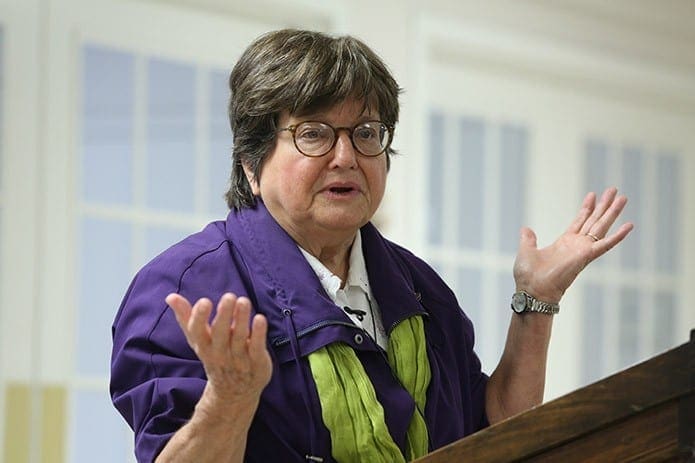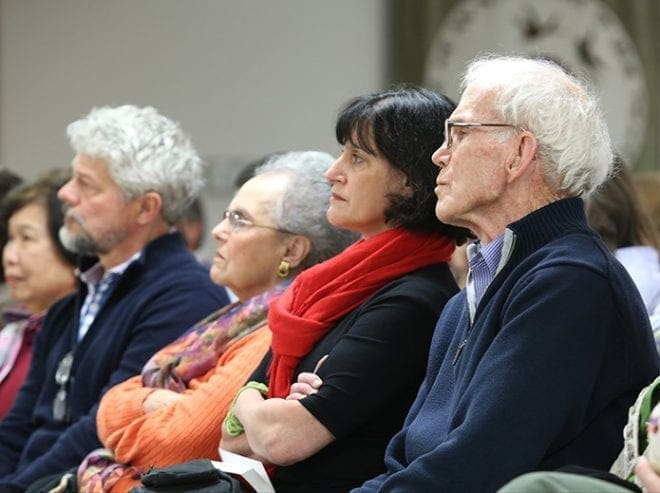 Photo By Michael Alexander
Photo By Michael AlexanderAthens
Sister Helen Prejean: Lethal injection is ‘experimentation’ on death row inmates
By ANDREW NELSON, Staff Writer | Published April 2, 2015
ATHENS—The country’s preferred method of executing prisoners relies on increasingly hard-to-find key drugs. To make up the shortfall, state executioners turn to compounding pharmacies to acquire new combinations of the lethal drugs.
In a talk at the Catholic Center at the University of Georgia, Congregation of St. Joseph Sister Helen Prejean called these drug cocktails for death row inmates “medical experimentation.”
“Now we are in a situation where states have to go try and find drugs and put them together,” she said. “It is medical experimentation.”
States are forced to come up with new drugs after the executive body of the European Union banned the sale of these drugs to the United States if they are used to execute prisoners, and some U.S. pharmacies stopped producing them.
“Now there’s national attention on this. How can you be letting these states experiment on killing people like this?” she asked.
States have had to go to compounding pharmaceutical companies to try and put together a lethal injection from one or more drugs. At the same time, information about the drugs being used, their expiration dates, or their sources is kept secret.
There is more transparency by veterinarian associations about euthanizing animals than “for the killing of human beings,” Sister Helen asserted.
States use a variety of protocols utilizing one, two or three drugs, according to the Death Penalty Information Center.
In 2013, the Georgia Legislature passed a law making the source of drugs used for lethal injections a state secret. According to the Death Penalty Information Center, Georgia uses a one-drug system, a lethal dose of pentobarbital, to execute inmates.
Georgia has stopped executions twice in four years over questions about the quality of the drugs, according to The Atlanta Journal Constitution. It most recently happened in March when the state was prepared to execute Kelly Gissendaner. The drug to be used appeared cloudy, according to reports.
Sister Helen said there is a “moral crunch” for many Catholics to believe that a pro-life position calls them to be advocates both for the innocent unborn and the guilty inmate.
In Catholic teaching, the death penalty is legitimate if it’s the “only available means to protect society,” according to the U.S. Conference of Catholic Bishops. Death penalty opponents believe inmates can be kept away from society by being held behind bars. The Catechism of the Catholic Church said modern means of imprisonment make the need for capital punishment “very rare, if not practically nonexistent.”
‘God wakes us up in his time’
Sister Helen spoke to a crowd at the UGA Catholic Center Sunday, March 22, as a fundraiser for the Ministry Against the Death Penalty she leads. She signed books and chatted with people after her 30-minute talk.

(R-l) Kevin Kelly, Pilar Delaplane, her mother Teresita Pagés and her husband Keith were among the 125 people on hand to listen to Sister Helen Prejean speak about her ministry against the death penalty. Sister Prejean spoke after two Masses at the Catholic Center at the University of Georgia on March 22. Photo By Michael Alexander
Attorney Kristin Waller is a public defender and a member of the Catholic Center. She said she was reminded how sacred life is after her brother died in a car crash. She came to realize she couldn’t continue to hate the other driver, Waller said. Forgiveness is “living out the Our Father,” she said.
Roy Carroll, a retired teacher, said he came to the talk open-minded about the death penalty, but the talk raised questions. He said, “She’s swayed me over to the other side.”
He said Sister Helen’s compassion made sense. “We don’t have to kill people because they killed people.”
Sister Helen is a member of the Congregation of St. Joseph, formerly the Sisters of St. Joseph of Medaille. The daughter of a Baton Rouge lawyer, the sister spent her early ministry in schools and teaching religion at local parishes. She was in her 40s when she embraced the Gospel’s call for social justice. In 1982, she agreed to write to a death row inmate, which led her to be a spiritual advisor to the men condemned to die.
“God wakes us up in his time,” said Sister Helen, speaking in her Louisiana lilt.
Her work gained international attention when her book “Dead Man Walking,” based on more than a decade of death row ministry, became a film. The actress Susan Sarandon won an Oscar in 1996 for her portrayal of the religious sister. The book has since been turned into an opera and a play.
Sister Helen said the death penalty is “a very broken system” that relies more on politics than justice. For her, the method is inconsequential. State executions have evolved from hanging to firing squad to gas chamber to lethal injection to simply appear more humane, she said. The core of the issue is the state has made a person defenseless and then kills them, she said.
A polarized society believes the only way to support a grieving family of a victim is to execute a person, she said. “There is a long history of solving social problems with violence.”
However, a spiritual life and following Jesus shows another way, she said.
The cross has two arms, on one side, the victim, and on the other side, the prisoner, she said.
“Jesus is in the middle. The Gospel stretches us to be on both sides,” she said.
After working on the issue for more than 30 years, starting with “little bitty talks,” Sister Helen said she remains hopeful.
There’s been a “precipitous drop” in the use of the death penalty as more people are aware of wrongly convicted inmates who are released from death row, she said. “People are not enthusiastic about the death penalty anymore.”
As a sign of growing unity against the death penalty, four national Catholic publications called for abolishing the death penalty in a joint editorial.
The publications America, National Catholic Register, National Catholic Reporter and Our Sunday Visitor shared the editorial published online on March 5. The publications urged the Catholic community “stand with us and say, ‘Capital punishment must end.’”
An audio of Sister Helen Prejean at the UGA Catholic Center is posted at: bit.ly/gb-srprejean.